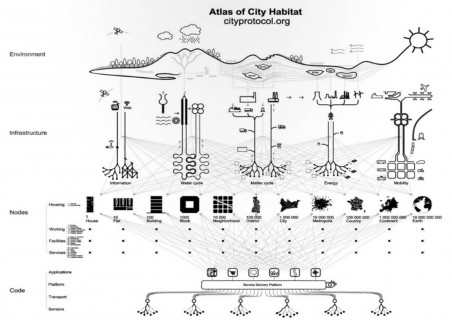By the end of 2018, City Protocol ended. The common solutions and principles are still relevant. Therefore, you can still find these useful insights on this page.
Cities have become the key nodes of the global economy, acting as magnets for the new hyper-connected communities. They play a singular role as hubs of innovation and sources of universal flows of information—produced by people, things and the interactions between them. How can cities approach these challenges and adopt sound financial strategies to become more livable and self-suficient, with empowered citizens?
1) A collaboration and knowledge sharing framework for the development of a new science of cities.
2) Establishment of the basis for the evaluation and accreditation of standards and recommendation documents for city transformations.
3) A set of methods and tools for system-level data analysis and representation, and a city knowledge base into specific learnings.
4) A ‘city language’ and set of common images for describing the City Anatomy.
5) Building a repository of documents describing projects, policies and recommended practices which may be tested in cities working and learning together to tackle their common transformational challenges.
6) A network and/or platform for education and knowledge sharing among all members.
What is the goal of the project?
City Protocol is a collaborative innovation framework that fosters city-centric solutions which benefit citizens and their quality of life. City Protocol defines an interoperable city platform, which will allow cities to communicate and operate across silos and across communities, spawning an ecosystem of solution development and innovation.
What is the result of the project?
It seeks to define a common systems view for cities of any size or type, and then embraces or develops protocols that will help innovators create – and modern cities deploy – cross-sectorial solutions that can connect and/or break city silos. City Protocol aims at working across diverse cities by interconnecting them and ultimately creating the “Internet of Cities”.
With City Protocol, innovators enjoy a robust market for their solutions, and cities enjoy solution choice, reduced cost and risk, and increased collaboration and learning – all while supporting the development of a Science of Cities
Who initiated the project and which organizations are involved?
Amsterdam, Barcelona, Béziers, Charlotte, Ciudad del Conocimiento Yachay- Ecuador, Dubai, Dublin, Gaziantep, Genova, Government of Catalonia, Kyiv Smart City, Montevideo, Moscow, Oviedo, Quito, Sant Feliu de Llobregat, The Hague, Vilanova i la Geltrú, Vitoria-Gasteiz City Council
Aigues de Barcelona, AvePoint, Bism@rt, Cast-info, Cellnex Telecom, CISCO, CityZenith, Ecube Labs Co., Ltd., ImexSystems Inc., KnowledgeKube, Microsoft, Nerei Emotional Intelligent, OptiCitis Ingeniería Urbana, Schneider Electric, Sociálitas
Bandung Institute of Technology, Cardus, Computation Institute – The University of Chicago, FUNITEC La Salle, Global Cities Institute – University of Toronto, IESE Business School, Institute for Advanced Architecture of Catalonia (IAAC), IUT Béziers, Universitat Autonoma de Barcelona, Universitat Rovira i Virgili
Consensus Institute Inc., Ecocity Builders, New York Academy of Sciences, SmartGAFSA, TICE.PT, Turkiye Bilisim Vakfi
What can other cities learn from your project?
The goal of City Protocol is to define an interoperable city platform, which will allow cities to communicate and operate across silos and across communities, spawning an ecosystem of solution development and innovation. In short, City Protocol aims to define the Internet of Cities. The Internet of Cities will provide common solutions and solution platforms, crossing the silos within and between cities.





